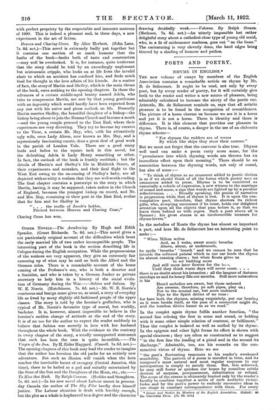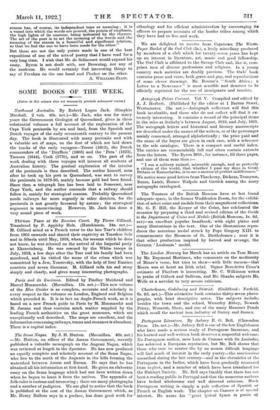POETS AND POETRY.
RHYME IN ENGLISH.
Liz new volume of essays by members of the English Association contains a remarkable article on rhyme by Mr. B. de Selincourt. It ought to be read, not only by every poet, but by every reader of poetry, for it will certainly give both to the reader and writer a new source of pleasure, being admirably calculated to increase the nicety of the poetic ear. Aristotle, Mr. de Selincourt reminds us, says that all artistic pleasure is to be found in the recognition of resemblances. The picture of a horse charms us because we see it is a horse and yet it is not a home. There is identity and there is difference. It is this element that provides our pleasure in rhyme. There is, of course, a danger in the use of an elaborate rhyme scheme- " For rhymes the rudders are of verses
By which like ships they steer their courses."
But we must not forget that the converse is also true. Rhyme well used can make a poem carry more sense, for the "prominence into which rhyming words are thrown has an immediate effect upon their meaning." There should be an association between the rhyming words, not only of sound, but also of sense :— " To think of rhyme as an ornament added to poetic diction is as if we should think of all the forms which poetry uses as ornaments added to prose. Rhyme is to be conceived as essentially a vehicle of expression, a new witness to the marriage • of sound and sense, a sign that words are lighted up by a peculiar reflectiveness. . . . Broadly speaking, the genius of narrative is progression while that of rhyme is rest. It is upon the con- templative poet, therefore, that rhyme showers its richest gifts, who, accepting movement if he must, holds our delighted attention upon all the objects that pass before it, so that we leave them behind us with regret. Such a poet above all is Spenser ; his great stanza is an inexhaustible treasure for rhyme-lovers."
In the melodies of Keats the rhyme has almost as important a part, and here Mr. de Selincourt has an interesting point to make When Milton writes
And, as I wake, sweet music breathe Above, about, or underneath, he spells breathe " breath ' and we cannot be sure that he intends the softened palatal which in our ear lends the rhyme its almost coaxing charm ; but when Keats gives us to set budding more And still more later flowers for the boos, Until they think warm days will never cease. . . .
there is no doubt about his intention ; all the languor of Autumn
envelops us and its honey fills our mouths. Still more miraculow is his
Heard melodies are sweet, but those unheard Are sweeter, therefore, ye soft pipes, play on ; Not to the sensual ear, but more endeared Pipe to the Spirit ditties of no tone : for here both the rhymes, missing exquisitely, put our hearing as it were beside itself, as the pass of a mesmerist might do, and the toneless ditties haunt us as we read."
In the couplet again rhyme fulfils another function, "the second line echoing the first in sense and sound, or holding with it some other simple relation of contrast, or fulfilment." Thus the couplet is isolated as well as unified by its rhyme. In the epigram and other light forms its effect is shown with special clearness ; they are often so constructed as to suggest "in the first line the loading of a pistol and in the second its discharge." Admirable, too, are his remarks on the con- structive virtue of rhyme. Here we see
" the poet's fluctuating responses to his reader's awakened sensibility. The pattern of a poem is unrolled in time, and its composer's most natural and most regular response to our anticipations is simply to satisfy them. But, this achieved, he may still foster or quioken our hopes by countless subtle devices of surprise, postponement, substitution or refusal. The scope of the stanza is ultimately limited only by the reader's faculty to combine together a series of such aesthetic vicissi- tudes and by the poet's power to embody successive ideas in one shape in constant correspondence with them. For every • Essays and Studies by Members of the English Association. Oxford : at the Clarendon Press. 17a. 6d. net.;
stanza has, of course, its independent tone or meaning ; it is a vessel into which the words are poured, the points of emphasis, the high lights of its contour, being indicated by the rhymes. The art of the poet is to set the meaning of the words and the meaning of the stanza in a beautiful and significant relation, so that we feel the one to have been made for the other."
But these are not the only points made in one of the best expositions of one of the arts of poetry that I have read for a very long time. I wish that Mr. de Selincourt would expand his essay. Byron is not dealt with, nor Browning, nor any of the moderns. He would certainly find interesting things to say of Frankau on the one hand and Flecker on the other.
A. Wit LTAIVIS-FT.T is



































 Previous page
Previous page